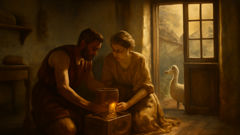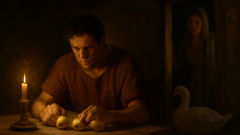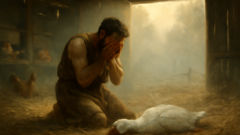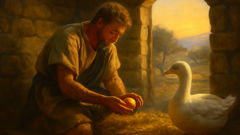Introduction
In a sun-drenched corner of ancient Greece, where olive groves shimmered in the morning light and the rolling hills cradled modest villages, there lived a farmer named Nikandros. The land was his inheritance—a patchwork of fields that had weathered seasons of drought and abundance, a home to generations of toil and hope. For Nikandros, every dawn began with the sound of roosters crowing and the gentle rustle of barley in the breeze. Life moved to the rhythm of the earth, slow and steady, filled with moments of joy and hardship alike. The people of his village respected him for his honesty, though he was known to grumble when the crops were lean or the sky withheld its rain. His wife, Dione, wise and kind, worked beside him, her laughter a balm to the ache of daily labor. Together, they scraped a humble living, grateful for what little they had, yet secretly yearning for a twist of fortune—a miracle to ease the burden from their weary shoulders. One fateful morning, as the world glowed gold with the promise of a new day, Nikandros discovered something extraordinary in his henhouse: a goose, snow-white and serene, nestled among straw, had laid an egg so radiant it gleamed brighter than polished bronze. At first, Nikandros could hardly believe his eyes. But when he lifted the egg and felt its heavy, solid weight, he knew it was no ordinary egg. It was pure gold. This single, miraculous moment would set into motion a story that would echo through the ages—a tale not only of sudden fortune, but of human longing, gratitude, and the perilous edge where hope gives way to greed.
A Miracle in the Henhouse
Nikandros stood motionless, his breath caught between disbelief and awe as he stared at the golden egg. The henhouse was no stranger to small miracles—clutches of chicks hatching, the comfort of warm feathers on cold nights—but this was something from the realm of legend, not the dirt beneath his feet. He ran his calloused fingers over the egg’s flawless surface, half-expecting it to vanish like a dream at dawn. Yet there it remained, heavy and real, nestling perfectly in his palm. Dione, summoned by his frantic shouts, entered the henhouse with a basket swinging from her arm. Her eyes widened at the sight of gold in her husband’s hands, but she met Nikandros’s astonishment with a level gaze. “The gods have smiled upon us,” she whispered, her voice trembling. “But let’s not lose our heads.”

They hid the egg beneath loose floorboards in their small cottage, their hearts racing with both excitement and fear. That night, sleep eluded Nikandros. He tossed in bed, mind swirling with possibilities—new tools for his field, perhaps even a fresh cow, or gifts for Dione. When dawn returned and Nikandros crept to the henhouse, hope danced within him. In the nest, beside the gentle goose, lay another golden egg.
Days passed, and the miracle repeated. Every morning, a new egg awaited him: shining, perfect, heavy with promise. Nikandros and Dione dared not speak of their fortune to anyone. The villagers noticed small changes—their cottage roof repaired, better bread at their table, a glimmer of contentment in their eyes—but none guessed the truth. Nikandros sold the eggs discreetly, traveling to distant markets, exchanging them for silver and grain. Their lives improved, yet the couple grew ever more cautious, guarding their secret as jealously as any dragon might guard its treasure.
For a time, gratitude ruled Nikandros’s heart. He tended his fields with renewed vigor, treating his animals gently, remembering to thank the goose each morning. Dione embroidered golden threads into her aprons, smiling at her husband as they worked side by side. Their home, once battered by wind and worry, grew warm with laughter and hope. But as the seasons turned and the pile of gold beneath their floor grew higher, gratitude began to blur. Nikandros’s thoughts wandered to all he still lacked: finer clothes, more land, a place among the wealthy merchants who visited the town square. Each golden egg seemed to pale beside the shining vision of what could be—if only he could have more, faster.
The goose herself remained unchanged: gentle, serene, her feathers as soft as clouds. She followed Nikandros in the fields, nibbled from Dione’s hand, never asking more than a place to nest and the warmth of their simple barn. But Nikandros no longer saw her as a marvel or a blessing. To him, she became a vessel—a promise of endless wealth, if only he were clever enough to unlock it.
The Weight of Greed
The first hints of greed crept quietly, like shadows at twilight. Nikandros found himself distracted during chores, staring at the horizon as if gold might sprout from the distant hills. Dione noticed his restlessness. She tried to anchor him with gentle words and the routine comfort of daily life: kneading bread, tending the garden, laughing with neighbors. But Nikandros had changed. Each golden egg became less a marvel, more an expectation. The urge for more grew within him, insatiable.

At night, Nikandros paced their cottage. He imagined the secret hoard beneath the floor—gold enough to buy olive groves, vineyards, perhaps even a house in the bustling city by the sea. He calculated how long it would take, how many eggs he would need to fulfill every craving. He dreamed of feasts and fine robes, respect and comfort. Dione’s warnings fell on deaf ears. “We have enough,” she insisted, her eyes earnest. “Let’s not anger the fates.” But Nikandros, blinded by longing, barely heard her.
He began to resent the goose’s pace. Why only one egg each day? Why not two, or ten? The thought gnawed at him, souring his gratitude. He watched the goose more closely, searching for clues. Was there some secret to her magic he could unlock? Did she eat something special, did she need more rest? The answers eluded him. One morning, as he waited for the familiar golden glow in the nest, he found himself gripping the edge of the straw, frustration burning hotter than hope.
Then, as if summoned by his mounting impatience, a dangerous idea took root. What if, instead of waiting day after day, he could have all the eggs at once? What if the goose, miraculous as she was, carried within her a treasure trove—a hidden cache of golden eggs waiting to be claimed? The thought festered, eclipsing reason. He could be rich overnight. No more hiding, no more waiting. Everything he wanted would be within reach.
Dione saw the storm brewing in her husband’s soul. She pleaded with him to let go of his obsession, reminding him of the blessings they already enjoyed. But Nikandros had passed beyond reason. In his mind, gratitude was a cage and patience a punishment. Greed had become his master, relentless and unyielding.
The Cost of Impatience
On a morning thick with mist, Nikandros rose before the first rays of sunlight could scatter the gloom. He moved silently, careful not to wake Dione, whose gentle breathing filled the cottage with a fragile peace. His hands trembled—not from cold, but from anticipation and a secret fear he refused to name. The plan was simple: today he would end his waiting. Today he would claim all the riches he believed he deserved.

He slipped into the henhouse, heart pounding against his ribs like a wild drum. The goose blinked at him, her calm eyes reflecting nothing of his turmoil. Nikandros knelt and stroked her soft feathers, whispering words he barely heard. For a moment, his resolve wavered. Then greed hardened his heart once more. He picked up his knife, the same one he used for harvests and chores. The act itself was swift and silent. When it was done, Nikandros felt an icy emptiness settle over him.
He searched desperately inside the goose, hands slick and trembling, certain he would find a nest of golden eggs hidden within. But there was nothing—no treasure, no miracle. Only silence and a growing sense of horror. The magic was gone. The daily gift that had turned his life upside down had vanished forever.
The morning grew brighter as Nikandros stumbled out of the henhouse. Dione met him outside, reading his face before he could speak. She wept—not only for the gentle goose, but for her husband’s soul, twisted by longing and regret. The villagers soon learned of the tragedy. Whispers spread: once, there had been a marvel in Nikandros’s care; now, there was only emptiness.
Grief and shame became Nikandros’s companions. The gold he had hidden beneath the floor lost its luster; no amount of wealth could fill the hollow space left by the loss of wonder. Each day felt heavier than the last. The farm’s fortunes waned, as if the land itself mourned with him. Dione’s quiet strength kept them afloat for a while, but the light had gone out in Nikandros’s eyes.
Conclusion
Time passed, and the golden eggs that once brought so much joy became little more than heavy reminders of Nikandros’s folly. The villagers soon forgot the brief prosperity that had shone from his cottage, and life in the valley returned to its quiet rhythm. Yet for Nikandros and Dione, nothing could return to how it was before. Regret lingered like a shadow in every corner of their home, a silent lesson woven into the fabric of their days. They tilled their fields and mended their fences, but the magic was gone—not just from their hands, but from their hearts. The story of the goose with the golden eggs became a cautionary tale told by firesides and in marketplaces across Greece. Parents spoke of Nikandros’s impatience and the price of his greed, teaching their children that true wealth lies not in gold or possessions, but in gratitude for the steady gifts of life. The fields still bloomed in spring, and birds still sang at dawn, but Nikandros had learned—too late—that the greatest treasures can’t be seized all at once. In his quiet moments, he remembered the gentle touch of feathers and the warmth of a daily miracle, understanding at last that wisdom grows only where patience and humility are allowed to take root.













